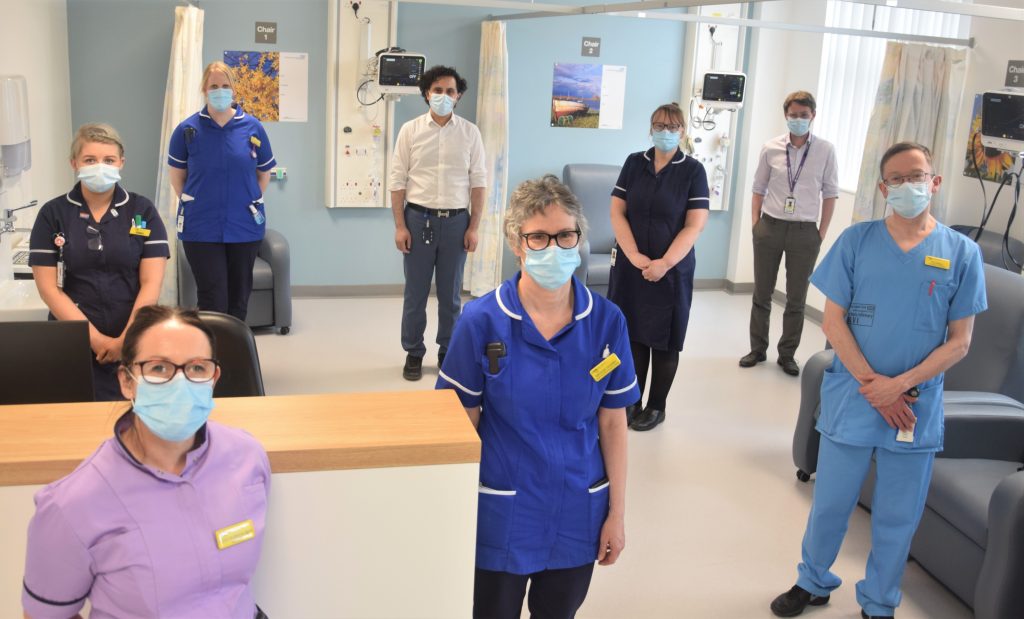A MULTI-MILLION pound purpose-built facility for patients with heart conditions has opened its doors at the Royal Victoria Infirmary.
The £2.5million acute cardiac care unit is a merger of two existing wards, and completely redesigned to support a new model of care including two newly appointed heart failure nurses.
“This is an extremely positive step towards providing our patients with greater streamlined care than before,” says Dr Ifti Haq, consultant cardiologist and head of cardiology at the RVI.
“The new layout of our acute cardiac unit means that we can offer heart patients significantly enhanced care and, importantly, in the right place at the right time.”
Specialist treatment zones
The new unit has three distinct treatment zones:
- A new four-bay cardiac day unit which can monitor, assess and treat patients with heart conditions who may not necessarily need an overnight hospital stay
- A brand new coronary care unit with six cubicles for patients who need high dependency care for emergency heart care and;
- A 17-bedded ward for patients who need to stay in hospital for specialist care.
Many patients come in as an emergency with chest pain that needs further investigation or atrial fibrillation – an irregular heart rate – which has exacerbated causing palpitations, dizziness or shortness of breath.

Consultant cardiologist, Dr Kris Bailey, who was key to introducing the new day unit explained: “Patients admitted by the Emergency Department or Assessment Suite with worsening heart failure or chest pain that needs further investigation are usually admitted to hospital for treatment and can have quite lengthy stays.
“Our new cardiac day unit will act as a short-stay care facility where patients can be assessed, treated and monitored for a time before being able to go home the same day.
“Although some people may need to attend for several days in a row, similar services in other areas around the country have been widely welcomed by patients. Patients with other heart conditions, not just heart failure, will also be treated via the new day-unit, overall reducing the number of overnight stays in hospital.”
To support the new ambulatory cardiac care model at the RVI, two new heart failure nurses, Nicola Hildreth and Maggie Fearby, have also been appointed.
They will see a lot of patients with long-term heart failure which has worsened, often due to fluid overload. This happens when there is too much fluid circulating around the body in the blood, causing swelling to ankles and pressure on the heart. In the majority of cases, this can be created quickly and without the need for an overnight stay in hospital.
Matron Nicola Robinson-Smith added: “A rapid transfer to our cardiac day unit for assessment and commencement of treatment means we should be able to stabilise their condition and get them back home where they want to be, all in the same day.”
Completed in 25 weeks from start to finish by the trust’s estates team, the newly refurbished unit also features dementia friendly décor and was carried out in such a way as to minimise its environmental impact as much as possible.
Dr Haq said: “We’d like to thank our estates team and many colleagues in procurement, portering and other support services, who have done a fantastic job getting our new facility delivered to their usual, highly exacting standards.
“Our specialist cardiac teams are delighted with their new environment and purpose built space which will enable them to continue to provide outstanding care to their patients.”
The unit at the RVI is part of the wider cardiothoracic services directorate which provides specialist care from both the RVI and Freeman Hospital sites.
The RVI’s cardiac unit sees patients who need emergency care for heart problems with the exception of surgical or more specialist treatment such as angioplasties for heart attacks caused by a blocked artery, usually by a blood clot.
These need to be treated urgently with a complex procedure called a coronary angioplasty which can only be carried in in specialist ‘Heart Attack Centres’ such as the Freeman Hospital.
